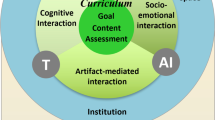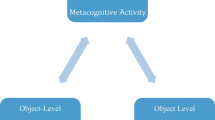Abstract
This study explored integrating formative assessment to a Chinese high school chemistry classroom, where the extremely high-stakes testing and Confucian-heritage culture constituted a particular context, through a collaborative action research. One researcher worked with a high school chemistry teacher in China to integrate formative assessment into his teaching with 54 students in one of his classes. Data resources included transcripts from planning sessions, lesson plans, teacher interviews, classroom observations, student work, student interviews and surveys. The findings of this study revealed that as the teacher allowed his original views about students’ learning and assessment tasks to be challenged by the students’ learning, his teaching practice and understandings of formative assessment were transformed. Students’ learning experience was also examined in the formative assessment process. The potentials and challenges of integrating formative assessment in the Chinese high school science classroom are discussed. This study indicated that formative assessment is promising to implement in Chinese high school science classrooms to enhance students’ learning and meet the imperative needs for high-stakes exam preparation as well; and writing formative assessment tasks are favorable in this particular socio-cultural context. Further, this study suggested that facilitating in-service science teachers to integrate formative assessment through collaborative action research is a powerful professional development on improving teaching and learning under the highly constraint context.


Similar content being viewed by others
References
Abell, S. K., & Volkmann, M. J. (2006). Seamless assessment in science: A guide for elementary and middle school teachers. Portsmouth, NH: Heinemann.
Aschbacher, P., & Alonzo, A. (2006). Examining the utility of elementary science notebooks for formative assessment purposes. Educational Assessment, 11, 179–203.
Ash, D., & Levitt, K. (2003). Working within the zone of proximal development: Formative assessment as professional development. Journal of Science Teacher Education, 14, 23–48. doi:10.1023/A:1022999406564.
Bell, B. (2007). Classroom assessment of science learning. In S. K. Abell & N. G. Lederman (Eds.), Handbook of research in science education (pp. 965–1006). Mahwah, NJ: Lawrence Erlbaum Associates, Inc.
Bell, B., & Cowie, B. (2001a). Formative assessment and science education. Dordrecht: Kluwer Academic Publishers.
Bell, B., & Cowie, B. (2001b). The characteristics of formative assessment in science education. Science Education, 85, 536–553. doi:10.1002/sce.1022.
Berry, R. (2011). Educational assessment in mainland China, Hong Kong and Taiwan. In R. Berry & B. Adamson (Eds.), Assessment reform in education: Policy and practice (Vol. 14, pp. 49–61). New York: Springer. doi:10.1007/978-94-007-0729-0_4.
Black, P. (2013). Pedagogy in theory and in practice: Formative and summative assessments in classrooms and in systems. In D. Corrigan, R. Gunstone, & A. Jones (Eds.), Valuing assessment in science education: Pedagogy, curriculum, policy. (Kindle edition). Netherland: Springer. doi:10.1007/978-94-007-6668-6_11.
Black, P., Harrison, C., Lee, C., Marshall, B., & Wiliam, D. (2003). Assessment for learning: Putting it into practice. Maidenhead: Open University Press.
Black, P., & Wiliam, D. (1998a). Inside the black box: Raising standards through classroom assessment. Phi Delta Kappan, 80, 139–148.
Black, P., & Wiliam, D. (1998b). Assessment and classroom learning. Assessment in Education: Principles, Policy & Practice, 5, 7–74.
Black, P., & Wiliam, D. (2005). Changing teaching through formative assessment: Research and practice. In Center for Educational Research and Innovation (Ed.), Formative assessment: Improving learning in secondary classrooms (pp. 223–240). Paris: OECD.
Brown, G. T. L., Kennedy, K. J., Fok, P. K., Chan, J. K. S., & Yu, W. M. (2009). Assessment for student improvement: Understanding Hong Kong teachers’ conceptions and practices of assessment. Assessment in Education: Principles, Policy & Practice, 16, 347–363.
Buck, G. A., & Trauth-Nare, A. E. (2009). Preparing teachers to make the formative assessment process integral to science teaching and learning. Journal of Science Teacher Education, 20, 475–494. doi:10.1007/s10972-009-9142-y.
Carless, D. (2011). From testing to productive student learning: Implementing formative assessment in Confucian-heritage settings. New York, NY: Routledge.
Carlson, B., & Chen, Z. (2013, June 7). You thought the SAT was bad? Meet the gaokao. Retrieved July 05, 2013, from http://www.globalpost.com/dispatch/news/regions/asia-pacific/china/130607/china-gaokao-exam.
Center for Educational Research and Innovation. (2008). Assessment for learning, formative assessment. Paper presented at OECD/CERI International conference: Learning in the 21st century: research, innovation and policy, Paris, France.
Chen, B. (2010). Stratification of teachers’ status and the basis for the organizational system. Chinese Education and Society, 43, 49–59. doi:10.2753/CED1061-1932430405.
Chin, C. (2006). Classroom interaction in science: Teacher questioning and feedback to students’ responses. International Journal of Science Education, 28, 1315–1346. doi:10.1080/09500690600621100.
Coffey, J. E., Sato, M., & Thibeault, M. D. (2005). Classroom assessment up close—and personal. Teacher Development, 9, 169–184. doi:10.1080/13664530500200246.
Creswell, J. W. (2007). Qualitative inquiry and research design: Choosing among five approaches (2nd ed.). Thousand Oaks, CA: Sage.
Creswell, J., & Miller, D. (2000). Determining validity in qualitative inquiry. Theory into Practice, 39, 124–130. doi:10.1207/s15430421tip3903_2.
Ding, B. (2006). Assessment for learning: Meaning, methods and rationale. Comparative Education Review, 189, 1–6. (in Chinese).
Feldman, A. (1996). Enhancing the practice of physics teachers: Mechanisms for the generation and sharing of knowledge and understanding in collaborative action research. Journal of Research in Science Teaching, 33, 513–540. doi:10.1002/(SICI)1098-2736(199605)33:5<513:AID-TEA4>3.0.CO;2-U.
Feldman, A., & Capobianco, B. M. (2008). Teacher learning of technology enhanced formative assessment. Journal of Science Education and Technology, 17, 82–99. doi:10.1007/s10956-007-9084-0.
Furtak, E. M., & Ruiz-Primo, M. A. (2008). Making students’ thinking explicit in writing and discussion: An analysis of formative assessment prompts. Science Education, 92, 799–824. doi:10.1002/sce.20270.
Gao, L. (1998). Cultural context of school science teaching and learning in the People’s Republic of China. Science Education, 82, 1–13. doi:10.1002/(SICI)1098-237X(199801)82:1<1:AID-SCE1>3.0.CO;2-L.
Gao, L. (2007). Assessment reform in China: A respond to the international trend in the new century. Retrieved from http://xypj.cersp.com/GLB/LUNWEN/200701/3223.html.
Gao, L., & Watkins, D. A. (2002). Conceptions of teaching held by school science teachers in P.R. China: Identification and cross-cultural comparisons. International Journal of Science Education, 24, 61–79. doi:10.1080/09500690110066926.
Geelan, D. R., Wildy, H., William, L., & Wallace, J. (2004). Teaching for understanding and/or teaching for the examination in high school physics. International Journal of Science Education, 26, 447–462. doi:10.1080/0950069032000097398.
Guba, E. (1978). Toward a methodology of naturalistic inquiry in education evaluation (CSE monograph series in evaluation no. 8). Los Angeles: University of California, Center for the Study of Evaluation.
Harlen, W. (2005). Teachers’ summative practices and assessment for learning—Tensions and synergies. The Curriculum Journal, 16, 207–223. doi:10.1080/09585170500136093.
Harvard University. (2010). A historic year for Harvard admission. Retrieved July 05, 2013, from http://news.harvard.edu/gazette/story/2010/04/a-historic-year-for-harvard-admissions/.
Heritage, M. (2007). Formative assessment: What do teachers need to know and do? Phi Delta Kappan, 80, 140–145.
Heron, P., & Reason, H. (2002). The practice of co-operative inquiry: Research ‘with’ rather than ‘on’ people. In P. Reason & H. Bradbury (Eds.), Handbook of action research (pp. 179–188). Thousand Oaks, CA: Sage Publications.
Jones, A., & Moreland, J. (2005). The importance of pedagogical content knowledge in assessment for learning practices: A case-study of a whole-school approach. The Curriculum Journal, 16, 193–206. doi:10.1080/09585170500136044.
Leat, D., & Nichols, A. (2000). Brains on the table: Diagnostic and formative assessment through observation. Assessment in Education: Principles, Policy and Practice, 7, 103–121. doi:10.1080/713613327.
Lee, W. O. (1996). The cultural for Chinese learners: Conceptions of learning in the Confucian tradition. In D. A. Watkins & J. Biggs (Eds.), The Chinese learner: Cultural, psychological and contextual influences (pp. 25–41). Hong Kong: CERC/ACER.
Lee-Hang, D., & Bell, B. (2013). Formative assessment as a cultural practice: The use of written formative assessment in Samoan science classrooms. In D. Corrigan, R. Gunstone, & A. Jones (Eds.), Valuing assessment in science education: Pedagogy, curriculum, policy. (Kindle edition). Netherland: Springer. doi:10.1007/978-94-007-6668-6_14.
Ma, H. (2013). Science teachers’ understandings of the college entrance examination in a climate of national curriculum reform in China. In D. Corrigan, R. Gunstone, & A. Jones (Eds.), Valuing assessment in science education: Pedagogy, curriculum, policy. (Kindle edition). Netherland: Springer. doi:10.1007/978-94-007-6668-6_10.
Marshall, B., & Drummond, M. J. (2006). How teachers engage with assessment for learning: Lessons from the classroom. Research Papers in Education, 21, 133–149. doi:10.1080/02671520600615638.
McMillan, J. (2003). Understanding and improving teachers’ classroom decision-making: Implications for theory and practice. Educational Measurement: Issues and Practice, 22, 34–43. doi: 10.1111/j.1745-3992.2003.tb00142.x.
Ministry of Education. (2001). Guidelines for Curriculum Reform in Basic Education (experimental draft). Government document, BMOE No 17(2001); June 7, 2001 (in Chinese).
Ministry of Education. (2003a). A guide for the reform in junior secondary graduation test and senior secondary enrolment system in national experimental regions on new curriculum. Government document, BMOE No 66(2003); October 8, 2003 (in Chinese).
Ministry of Education. (2003b). The curriculum scheme of general senior secondary schools (pp. 4–5). Beijing: Peoples’ Educational Press. (in Chinese).
Ministry of Education. (2013). Statistics of national college entrance exam. Retrieved July 05, 2013 from http://edu.people.com.cn/n/2013/0503/c116076-21359059.html (in Chinese).
Ministry of Education of China (MOE). (2010). Blueprint for medium and long-term national education reform and development (2010–2020). Retrieved January 12, 2011, from http://www.gov.cn/jrzg/2010-07/29/content_1667143.htm (in Chinese).
National Research Council [NRC]. (2001). Knowing what students know: The science and design of educational assessment. Washington, DC: National Academy Press.
Nieswandt, M., & Bellomo, K. (2009). Written extended-response questions as classroom assessment tools for meaningful understanding of evolutionary theory. Journal of Research in Science Teaching, 46, 333–356. doi:10.1002/tea.20271.
Otero, V. K., & Nathan, M. J. (2008). Preservice elementary teachers’ views of their students’ prior knowledge. Journal of Research in Science Teaching, 45, 497–523. doi:10.1002/tea.20229.
Paris, S. G., Lawton, T., Turner, J., & Roth, J. (1991). A developmental perspective on standardized achievement testing. Educational Researcher, 20, 12–20. doi:10.3102/0013189X020005012.
Phelan, P., Davidson, A., & Cao, H. (1991). Students’ multiple words: Negotiating the boundaries of family, peer, and school cultures. Anthropology and Education Quarterly, 22, 224–250. doi:10.1525/aeq.1991.22.3.05x1051k.
Pine, G. J. (2009). Teacher action research: Building knowledge democracies. Thousand Oaks, CA: Sage.
Reason, P., & Bradbury, H. (2008). The SAGE handbook of action research: Participative inquiry and practice (2nd ed.). Thousand Oaks, CA: Sage Publications.
Ross, H., & Wang, Y. (2010). Guest editors’ introduction: The College Entrance Examination in China: An overview of its social-cultural foundations, existing problems, and consequences. Chinese Education and Society, 43, 3–11. doi:10.2753/CED1061-1932430400.
Sadler, D. R. (1989). Formative assessment and the design of instructional systems. Instructional Science, 18, 119–144. doi:10.1007/BF00117714.
Sato, M., Coffey, J., & Moorthy, S. (2005). Two teachers making assessment for learning their own. Curriculum Journal, 16, 177–191. doi:10.1080/09585170500135996.
Shepard, L. A. (2000). The role of assessment in a learning culture. Educational Researcher, 29, 4–14. doi:10.3102/0013189X029007004.
The State Council of China (SCC). (2001). Resolution about basic education curriculum reform and development. Retrieved January 17, 2010, from http://www.edu.cn/20010907/3000665.shtml (in Chinese).
Torrance, H., & Pryor, J. (2001). Developing formative assessment in the classroom: Using action research to explore and modify a theory. British Educational Research Journal, 27, 615–631. doi:10.1080/01411920120095780.
Tweed, R. G., & Lehman, D. R. (2002). Learning considered within a cultural context. American Psychologist, 57, 89–99. doi:10.1037/0003-066X.57.2.89.
Wiliam, D., Lee, C., Harrison, C., & Black, P. (2004). Teachers developing assessment for learning: Impact on student achievement. Assessment in Education: Principles, Policy & Practice, 11, 49–65. doi:10.1080/0969594042000208994.
Zeng, K. (1999). Dragon gate: Competitive examinations and their consequences. New York, NY: Cassell & Continuum.
Zhang, B., Krajcik, J. S., Sutherland, L. M., Wang, L., Wu, J., & Qian, Y. (2003). Opportunities and challenges of China’s inquiry-based education reform in middle and high schools: Perspectives of science teachers and teacher educators. International Journal of Science and Mathematics Education, 1, 477–503. doi:10.1007/s10763-005-1517-8.
Zhong, Q. (2012). Classroom assessment and development of teachers’ accomplishment of classroom assessment. Research of Modern Basic Education, 5, 111–115. (in Chinese).
Acknowledgments
This research is supported by E. Wayne Gross Pre-doctoral Dissertation Research Fellowship from Indiana University.
Author information
Authors and Affiliations
Corresponding author
Additional information
Lead Editor: A. Oliveira
Rights and permissions
About this article
Cite this article
Yin, X., Buck, G.A. There is another choice: an exploration of integrating formative assessment in a Chinese high school chemistry classroom through collaborative action research. Cult Stud of Sci Educ 10, 719–752 (2015). https://doi.org/10.1007/s11422-014-9572-5
Received:
Accepted:
Published:
Issue Date:
DOI: https://doi.org/10.1007/s11422-014-9572-5




